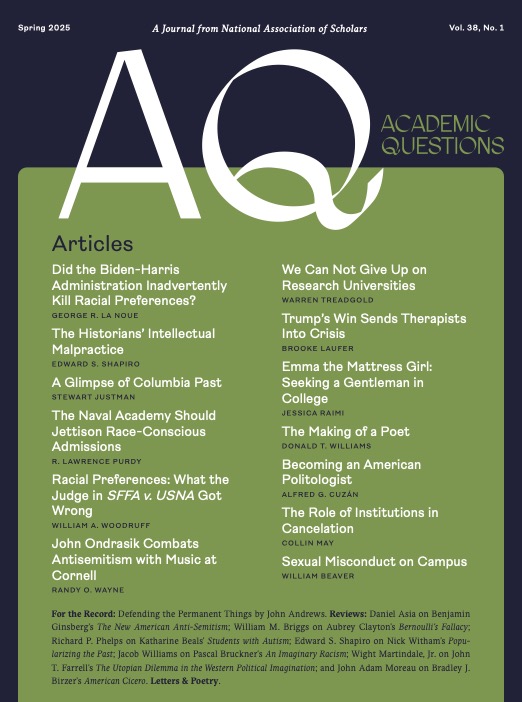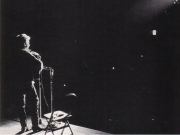Battle fatigue. War-weariness. Discouragement. If you are a conservative in higher education today, a scholar with any conscience at all, discouragement is a strong temptation—a relentless undertow. I get it. I’ve been there.
But I’m here today to speak encouragement into that bleak discouraging landscape. We are not alone in the fight. A remnant is even now finding its voice. Others have gone before us to mark the way.
Listen to this battlefield report by one of the greatest minds and greatest men that ever lived:
We stay at our post, alert, unswerving—in hard times, tough times, bad times, when we’re beaten up, jailed, mobbed. Working hard, working late, working without eating. With pure heart, clear head, steady hand. In gentleness, holiness, love, when we’re telling the truth, when we’re doing our best setting things right.
When we're praised and when we’re blamed, slandered and honored, true to our word, though distrusted—ignored by the world, but recognized by God. Terrifically alive though rumored to be dead—beaten within an inch of our lives, but refusing to die—immersed in tears, yet always filled with deep joy—living on handouts, yet enriching many—having nothing, yet having it all.
Can you and I identify with that, or what? Isn’t that us to a T?
It’s the voice of the Pharisee Saul of Tarsus, known to history as the Apostle Paul. The fight he took on was not a fair fight at all. The only weapons at his command were words and ideas. But he used those words and ideas, along with reason and logic, along with evidence and experience, to change the world. Or better said, to enlighten and enliven the world. Somewhat as you and I have set out to do—against all odds.
Against all odds. If anyone had cause for discouragement and war-weariness, Paul did. All worldly powers stood in league against him. Herod and Pilate, two scorpions in a bottle except when it came to stamping out the sedition of the Nazarene. Jerusalem, Athens, Rome—mutually suspicious on all else, but as one in wanting no part of Paul.
Still he soldiered on—“filled with deep joy,” as he said of himself, and “terrifically alive” even when rumored dead. (I’m quoting from his second letter to the Christians at Corinth, in Eugene Peterson’s brilliant Bible paraphrase, The Message.)
Still he soldiered on, did St. Paul—shall not you and I likewise find the moral and intellectual and cultural and yes, spiritual resources to soldier on as well? We owe America and Western civilization that much, surely. So down with discouragement. Battle fatigue, begone! Onward in the fight.
How good it is to have the National Association of Scholars convening here. I have loved and admired the NAS since the first day Steve Balch took down his musket from the mantelpiece and went out to man the barricades, daring the rest of us to follow. I now have the honor of formally welcoming you to our beautiful state of Colorado.
I hope your visit here provides a Rocky Mountain high, the authentic John Denver experience—entirely drug-free, of course. My lifework here in the shadow of the Continental Divide—spanning 50 years—has interwoven politics and education and media and ministry—all in the name of defending what T.S. Eliot called "the permanent things.”
And what are those things? Eliot didn’t elaborate, but I think we all know. Truth, beauty, goodness: objectively real, intrinsically valuable, knowable to the mind of man, permanent. Justice, courage, prudence, temperance: the classical virtues unchanging from Homer’s time to our own time.
Permanent. Human nature and the human condition, in all its glory and all its stubborn imperfection. Above the beasts but below the angels. Permanent.
“Reality Bites,” if you want to reduce the whole thing to a bumper sticker from a Ben Stiller movie. It’s what Thomas Sowell calls the constrained vision. It’s what Rudyard Kipling called “The Gods of the Copybook Headings.” I’d have that whole poem tattooed on the inside of my eyelids if there was room…
It was the great Russell Kirk who would eventually take T.S. Eliot’s one-line reference to the permanent things in a 1937 lecture and spun it into an entire 1969 book, The Enemies of the Permanent Things.
According to his biographer, Bradley Birzer of Hillsdale College, Kirk distilled his deepest beliefs about the conservative mind into ten basic points. We as conservatives, Kirk asserted,
1- Believe that there exists an enduring moral order.
2- We adhere to custom, convention, and continuity.
3- We believe in the principle of prescription.
4- We are guided by the principle of prudence.
5- We pay attention to the principle of variety.
6- We are chastened by the principle of imperfectibility.
7- We are persuaded that freedom and property are closely linked.
8- We uphold voluntary community and equally oppose involuntary collectivism.
9- We perceive the need for prudent restraints upon power and upon human passions.
10- We understand that permanence and change must be recognized and reconciled in a vigorous society.
Pretty good marching orders for any of us setting out to defend the permanent things, wouldn’t you say? As far back as the 1960s, some of us can remember Professor Kirk's regular column in National Review as a running combat report on his endless struggle against the dark forces and intellectual pygmies that even then dominated Behemoth University, his scornful nickname for Michigan State.
What a giant. He was a one-man National Association of Scholars back in those days, and that was two or three generations ago. Imagine how Russell Kirk would feel today if you parachuted him into the midst of the cowardice, corruption, and chaos that now define Harvard, Columbia, or Berkeley.
The opportunity to shake hands with Kirk one time, and on other occasions to shake hands with the likes of Friedrich Hayek, William F. Buckley, and Ronald Reagan, is one of my cherished keepsakes of a lifetime in the trenches of the right.
To have shaken hands with Bill Clinton, Hillary Clinton, and yes, Leonid Brezhnev, not so much. I have washed and washed that hand to no avail. Shades of Lady Macbeth.
But again I digress. It comes of reading too many of Peter Wood’s madcap begging letters, with their captivating illogic and sly self-parody. When I am president, Wood, I want you for my Treasury Secretary—either that or heading up the Ministry of Truth.
Peter Wood invited me here to speak encouragement into your beleaguered citadel. Maybe the best way to do that is to say a little bit about how it’s going here in Colorado. I’ll tell you about one bold idea that didn’t work, and one bold idea that seems to be starting to work.
The last time that Colorado Republicans controlled the governorship and both houses of the legislature was twenty years ago, 2003 to 2004. Leftism was already rampant throughout the University of Colorado system and the Colorado State University system. Conservative faculty, conservative students, and conservative ideas were an endangered species. The permanent things were increasingly marginalized.
As president of the state Senate, I was approached by David Horowitz, the ex-communist turned freedom fighter, to propose legislation establishing what he called the Academic Bill of Rights for all taxpayer-funded universities and colleges in Colorado.
What a concept. There were eight basic standards that all of us in this room would welcome and applaud. Indeed, the standards differed little from the classical ideals of academic freedom to which the AAUP has paid lip-service since 1915.
The eight standards in brief (and here I’m paraphrasing) were these: Viewpoint neutrality in faculty hiring, firing, and promotion. Viewpoint neutrality in faculty committee assignments. Viewpoint neutrality in the grading of students. Viewpoint neutrality or diversity in course materials.
No political, ideological, or religious indoctrination in the classroom. Intellectual pluralism in campus speaker programs. Disallow cancel culture and the heckler’s veto throughout the campus community. Organizational neutrality in all phases of university research activities.
But before Colorado could lead the way into a new golden age of American higher education, the whole thing crashed and burned on takeoff. We knew from the outset that implementation and enforcement of the new standards wouldn’t be easy.
We knew that passing the bill—once drafted to our satisfaction, assuming that was even possible—would require a massive effort in public persuasion, given the entrenched power of the higher-ed status quo. That is to say, we thought we knew all this. We didn’t know the half of it.
An orchestrated effort of leaks coming out of our initial closed-door planning sessions led to waves of media hysteria about thought control, witch hunts, and the like. David Horowitz, Sen. John Andrews, and Gov. Bill Owens were demonized as the enemies of intellectual freedom. Every Republican legislator with a campus in his district was strong-armed or sweet-talked by worried administrators. Jobs were at stake, after all. Payroll was at stake. Reelection was at stake.
My narrow 18-17 margin of control in the Senate wasn’t going to hold. We looked at starting the bill in the more-conservative House, but that too seemed doubtful. We looked at Plan B, then Plan C, and we finally settled for a non-binding Memorandum of Understanding, by which institutions pledged their best effort to implement the eight standards.
Self-policing, in other words. Fat chance. CU President Betsy Hoffman, with an audible sigh of relief and a barely-concealed smirk of victory, solemnly signed on the dotted line. I left office on term limits soon thereafter, and that was the last that anyone in Colorado ever heard of the Academic Bill of Rights.
Lessons learned? Three of them come immediately to mind, each as obvious and timeworn as anything in Kipling’s copybook. One, money talks. Two, power isn’t patty-cake.
And three, don’t try to eat the whole elephant in one bite—especially if it’s an easily-frightened Republican elephant whose members are too often maladroit at education policy and the culture wars.
As the Obama years came on, Democrats tightened their dominance of most of our state’s commanding heights, but the elected board of regents of the University of Colorado was an exception.
There a tough-minded GOP majority took to heart the lessons of the Horowitz fiasco and proceeded incrementally, with money and power on their side. In 2006 they established at CU-Boulder, the state’s flagship institution, a Center for the Study of Western Civilization.
We all remember the Stanford protests of 1987, with Jesse Jackson leading the chants of “Hey hey, ho ho, Western culture’s got to go.” The CU regents now replied in essence, “Not here in Boulder. Not on our watch!” The Western Civ center would stand as a defiant enclave defending the permanent things, like West Berlin in the days of the wall, like Guantanamo in Cuba even today.
Christian Kopff, professor of classics, provided magnificent leadership in the center’s early years. It was the Robbie George model, piloted at his James Madison Center at Princeton and since then emulated in state after state across the country.
But did I mention that money talks? The CU center had its full complement of both ruthless enemies and spineless bureaucrats to contend with. Until an endowment could be secured, budgetary or curricular near-death experiences would be endless.
The breakthrough finally came in 2019 when Bruce Benson, an independent oilman who had been CU’s president since 2008, settled several million dollars of his own on the Western Civ center, which was accordingly renamed for him.
The Benson center is best known for its one-year revolving chair, the Visiting Scholar in Conservative Thought and Policy. Scholars since 2013 have included Steven Hayward, Bradley Birzer, Brian Dimitrovic, Francis Beckwith, Robert Kaufman, William B. Allen, Stephen Presser, Colleen Sheehan, John Eastman, Alan Kahan, Todd Zywicki, Brandon Warmke, and the current incumbent, Patrick Deneen.
I’m of two minds about the visiting conservative scholar idea. To slap a conservative tag on one particular individual and cycle him through various teaching and speaking assignments for one academic year is almost to make a zoo exhibit out of we few believers in the permanent things. Come closer, take a look. He won’t bite. Seldom before observed in captivity. How exotic!
On the other hand, one more conservative turned loose within the faculty ecosystem, made over and celebrated, is one more conservative. We’ll take it when we can get it. We have to start somewhere.
And the very fact that CU’s powers-that-be, in hosting the Benson visiting scholars, are conceding that academicians on the right are as rare as unicorns, is a backhanded admission that intellectual diversity at this and most other higher-ed institutions has become a bad joke. They would be shamefaced about it—if they had any shame.
The University of Colorado overall is endowed at about $2 billion. The Benson Western Civ program is endowed at about $20 million, just one percent of the host institution. Still, money talks, and this money says we’re not going anywhere. The land of lies, Cuba if you will, is yesterday’s news. The little enclave of truth, Guantanamo, is tomorrow’s hope. The permanent things are just that—permanent—and they’re coming back.
Another time we could talk about independent higher education in Colorado. If you want Ivy League wokeism at a mile above sea level, we have the University of Denver a few blocks south of here or Colorado College an hour south of here in Colorado Springs. If you want Catholic lite, we have Regis University a couple of miles west.
Whereas if you want the rigor of Aristotle, the self-evident truths of Jefferson, and the permanent things of Eliot and Kirk, we have my adopted alma mater out west toward the foothills, Colorado Christian University.
I worked at CCU for several years under their late president, Senator Bill Armstrong, and my grandson later went there. They recently dedicated a splendid new building in Armstrong’s memory—a library, music center, and chapel—and at the ceremony his successor, Donald Sweeting, offered a succinct side-by-side sketch of that institution in comparison with most higher education today. It’s worth quoting at length as we conclude here.
Too many schools [he said] have given up the beliefs that you need to have for a university to work. They no longer believe in the truthfulness of truth, let alone the unity of knowledge. They won’t teach character because they can’t agree on what it is. The belief that we have a common human nature is also fading. Wisdom is not talked about. Reason is suspect. Core curriculums are rare.
The West, the United States, and Israel are bad. The Judeo-Christian heritage is considered oppressive. Merit, assessment and excellence are devalued. Biological sex is ignored. Debate is stifled. Reading long-form books is too difficult. Ideologies like critical theory reign. And Christophobia is pervasive.
But at Colorado Christian University [Dr. Sweeting went on, we believe very differently]. We believe that the pursuit of truth matters, that moral formation is important, that the fear of the Lord is the beginning of wisdom. We want to teach the best of our heritage.
We encourage debate. We want students to be shaped by goodness, beauty, and truth, because we believe in goodness, beauty, and truth! We believe that texts—the written word—matters, and some are worthy of deep and careful study. We still believe in excellence. We don’t coddle our students. Rather, we want them to become courageous and resilient.
Thus Donald Sweeting, chancellor of Colorado Christian University. He closed by challenging his CCU audience that day to join in the great moral and spiritual endeavor of putting the “higher” back in higher education.
It’s a challenge I accept, because it’s truly a matter of life and death for our civilization.
I know it’s a challenge you accept. Your being here today proves it. The National Association of Scholars exists for that very reason.
Let us commit ourselves to the task. Let us not falter or fail. Let us prevail.
Thanks very much for your attention this morning.
John Andrews served as state senator in Colorado from 1998-2005 and held the positions of President of the Colorado Senate, chairman of the State Policy Network, and director of TCI Cable News. Andrews was a speechwriter for President Richard Nixon; an education appointee under Presidents Ronald Reagan and George W. Bush; and founder of the Independence Institute and co-founder of State Policy Network. He made these remarks to the National Association of Scholars in Denver, Colorado on October 25, 2024 at the NAS membership meeting.
Photo by Stephen Tafra on Unsplash














